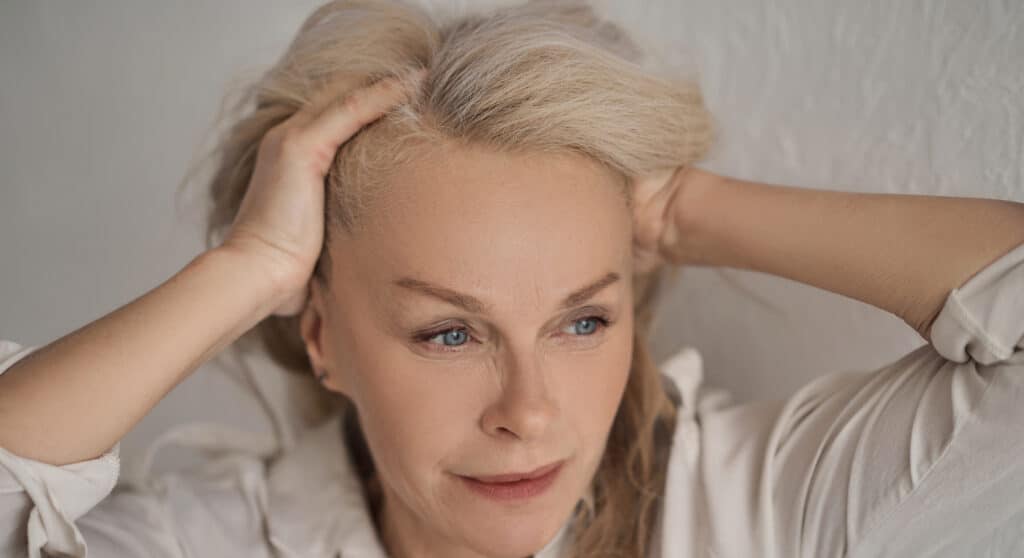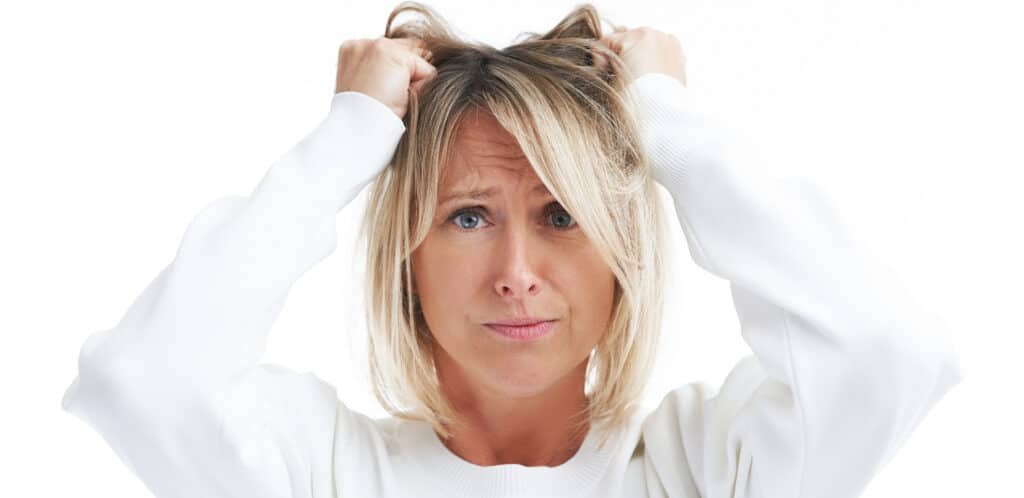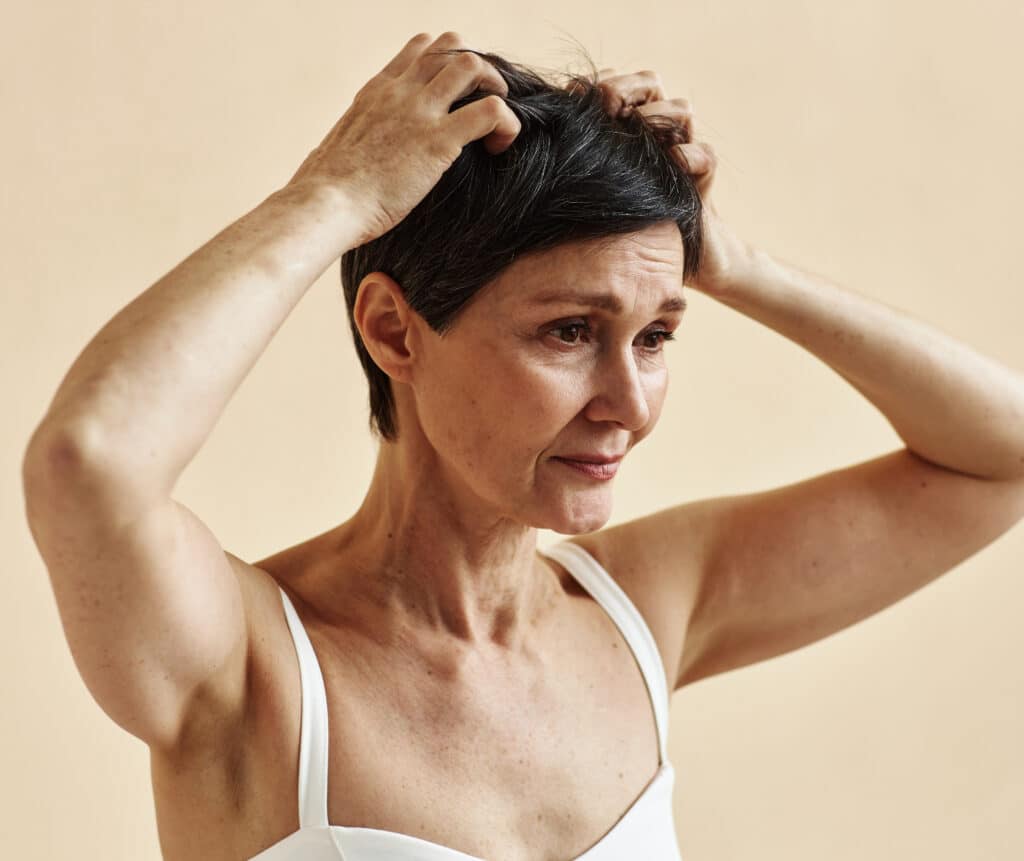Want to cut the ties between menopause and hair loss and sport lustrous locks post menopause? While menopausal hair loss is real, it doesn’t have to be when there are ways around it.
Menopause is a natural part of a woman’s life and every woman goes through this phase. A lot of changes happen during this time, including hair loss. Let’s understand more about the connection between menopause and why women lose hair during this phase and how to combat it. So, let’s get started.
Menopausal Hair Loss
Women go through menopause anywhere between 45 – 55 years. This is a natural process but there’s a lot women go through during this time – too many changes in their body, mind and even hormonal changes.

Hair loss is very common during this time, thanks to the many changes we go through. But for some, that’s the least of their concerns. Unwanted hair growth, hot flashes, sleep issues and whatnot! Did you know androgenetic alopecia or female pattern hair loss affects most women during or after their menopause?
Many women experience hair loss during this transition phase, which is marked by diffuse thinning or loss of scalp hair. Some women lose more hair than others. Irony is that, more often women are preoccupied with other changes to even notice hair loss when it starts!
But with further hair loss it becomes more apparent, and they begin to look for ways to curb hair loss and improve hair growth. Menopausal hair loss is a common condition affecting many during the menopausal transition.
Menopausal women lose hair due to genetics, hormones and other reasons. The good news is that not all hair loss during menopause is permanent.
What Causes Menopausal Hair Loss?
As noted earlier, there’s a lot going on internally during menopause. Women’s health is tested during this time and how they have taken care of their body reflects on how seamlessly their transition goes. While there could be other contributors including environmental factors, let’s look at the three major contributors for hair loss that happens during this time.
Hormones
Wondering if we can talk about something else? I can understand your frustration – anything and everything we talk about women – hormones seems to get a mention!
Jokes apart – but hormonal fluctuations are a reality during menopause. Most notably, progesterone and estrogen levels decline during this time. This is considered one of the key contributors for hair loss, due to the contribution of these hormones in hair growth.
Also, the male hormones, typically androgens, have a hand in the significant hair loss during this phase. Probably why many experience excessive hair growth in unwanted areas!
Genetics
A lot of aspects in our life are influenced by genetics. Isn’t it? That’s also why they probe family hair loss history when we go for hair loss treatment. There’s a reason androgenetic alopecia is also called female pattern hair loss!
Stress
When you’re stressed, hair loss follows. High stress levels are a given during the menopausal phase, what with the numerous changes we’re going through. Right, ladies?
We also know stress doesn’t have to be emotional, it could also be physical. How this phase affects one individual can vary, but most women experience hair loss during menopause.
How to Make Sure it’s Hair Loss?
There are some telltale signs if you’re experiencing during the menopause transition. Let’s take a look at the common ones that help identify.
Widening hair part – if you have a habit of sticking to your hair part, it’s easier for you to catch this.
Hair thinning – while some women only notice missing hair a little later after hair loss started, it is because women lose hair all through their scalp. This means, bald patches are rare. It seems more like hair thinning due to overall reduction in volume and thickness.
Reduced hair growth – This is again due to various reasons, but more so due to the hormonal changes.
Hair Loss – this is a given, the reason why we’re discussing it in detail, right?
Remedies for Menopausal Hair Loss
If your facing hair loss during menopause, you’re not alone. There are natural remedies and options you could try first. Let’s take a look at a few options you can consider.

Herbs
There are many herbs you could try to combat hair loss and other symptoms including thinning hair. The most common herbs that have shown good results include Saw Palmetto, Ginseng, Onion, Hops, Black Cohosh, Red Clover and Maca Root. Not just to combat menopausal hair loss, some also improve women’s health and strength.
Scalp massage
Scalp massage is one of the best ways to enrich a hair follicle and combat hair loss. Do you know it strengthens thinning hair and improves hair health? Let’s not forget the stress relief benefits it offers! Who doesn’t love a good massage, heh?
Carrier & Essential Oils
Oils play a key role in the health of hair in alternative medicine. There are many recipes to combat hair loss during menopause or otherwise. Depending on where you live and other factors, the oils may vary.
My favorite way to stimulate hair growth and grow more hair has always been a combination of carrier and essential oil. Even herb infused oils are now available and that makes the carrier oils even more beneficial.
Hair beneficial carrier oils include coconut oil, argan oil, sweet almond oil, olive oil, castor oil, etc. With essential oils too you have a long list of choices to pick from including Lavender, Rosemary, Sage, Chamomile, Basil, Juniper Berry, Ylang Ylang, etc.
While some basics remain the same, each ingredient can offer certain benefits and work better for some. So, do trial and error and pick the ones that work for you best.
Lifestyle & Dietary Changes
As mentioned earlier, androgenetic alopecia affects many women during or after their menopause. But that’s not the only reason for hair loss during menopause. Making few simple changes can go a long way in dealing with issues during these trying times and encourage hair regrowth.
Nutrition
Women’s health should be of paramount importance during this time to help cope and manage the transition. Nutrition plays a key role in keeping them upbeat and healthy, and also prevent hair loss that’s triggered due to nutritional insufficiencies that are common during this time.
Many physicians recommend supplements during this time. So consult your physician and discuss what would work best for you and the right dosage. Many women who come into Vitamins Revive have shared they experience reduced energy levels and weakness, so nutritional supplements are more needed than ever before.
Also, consuming a healthy diet really helps during this time. A well balanced diet with a lot of greens, veggies, nuts and seeds and fruits are the need of the hour. If you did not have a platter that has a variety of foods, START NOW!
Including Vitamin D and Omega 3 not only helps combat hair loss and stimulate hair growth, they also help with mood swings in some cases!
Styling & Hair Care
A lot has been said about styling – it needs no introduction. We all do it on some level. Keeping styling to a minimum, including reducing or avoiding the use of hair dryers can really help.
Too much heat and styling treatments take a toll on your hair and can leave them damaged. Do you know some have been left with permanent damage due to styling?
Also, use mild and gentle hair care products that include natural ingredients and no damaging or harsh chemicals.
Sleep & Stress
Sleep plays a key role in our health and hair! It also has a hand in our stress levels and hormonal balance. Not only that, getting enough sleep prevents weight gain! Did you know that?
Stress management is very important when you want to curb hair shedding and encourage hair growth. Did you know chronic stress can affect the health of your hair follicle and bring hair out of anagen phase sooner?
Treatment Options
Modern science has come a long way in dealing with hair loss. Not just female pattern hair loss, there’s a list of treatment options you can consider to combat hair loss, promote healthy hair growth and more.
Medications
There are medications including minoxidil that help combat hair loss conditions including androgenic alopecia, stimulates hair follicles, improves blood flow to the scalp, combats hair follicle miniaturization and increases the diameter of the hair follicle.
Another topical medication called finasteride works as a DHT Blocker to combat hair loss that’s due to excessive male hormones or DHT.
Treatments
HRT or hormone replacement therapy is an option that’s recommended for promoting hair growth especially when combatting hair loss due to hormonal imbalance.
Hair transplants are chosen as a last resort especially when the options for hair regrowth are ni, or due to other factors.
Low level laser therapy is another treatment option that’s also called red light therapy has been used to improve hair growth, especially in those who lose hair due to androgenic alopecia.
Platelet rich plasma therapy is another option one can consider. Platelet rich plasma therapy is where one’s own platelets are used to combat hair loss during menopause. Research suggests there’s good results in many who have tried it.
Conclusion
Menopause brings with it scores of other issues including but not limited to hair breakage, weakened hair shaft, changes in hair texture, hair loss, etc. Hair grows considerably slower for many due to the changes in hormone levels.
Understanding what’s causing the hair loss is the first step in treating it. There could be any number of reasons including certain medications, underlying health conditions, nutritional insufficiency and more.
Consulting a specialist can help diagnose and deal with the issues in a timely manner. There are times when a specialist can give a different perspective to a problem and that can really help.
Not able to find a solution? That’s what experts are there for. Get the help you need, and on time! Every woman will experience menopausal hair loss but it can be managed effectively and menopausal symptoms can be handled better when taking the right steps. Are you ready for it?
FAQs
How hormonal changes affect hair growth?
We all know estrogen promotes hair growth, and androgens curb it. What happens during menopause? Yes, estrogen levels go down and that leads to reduced hair growth rate and hair loss.
If that’s not enough, the hair growth cycle is also affected and many find their hair shorter! Even progesterone that plays a key role in hair growth takes a hit during this phase.
If all this is not enough, androgens are on overdrive, hair follicles shrink and even hair looks very different. Ever heard the term menopause hair? A lot of hormone levels are out of whack! What else do you think happens?
When to seek help?
Do you notice considerable thinning or bald spots? Is your hair loss sudden or excessive? Have a family history of hormonal imbalances and hair loss? Your symptoms or issues not responding to remedial measures? It’s time to get help!
There are blood tests that help diagnose underlying issues and deal with them effectively. Identifying issues is the key to getting a resolution, isn’t it? They help identify the issue and also suggest ways to deal with it.
Is menopause hair loss permanent?
No, hair loss during menopause isn’t always permanent. Some women have experienced regrowth post regulation of hormones. More than half women have found relief with treatments or remedies.
Why avoid hair coloring?
Hair coloring can weaken your hair shaft and often leave you with hair damage, especially when coloring is done frequently and using harsh chemicals. A nourishing conditioner alone is not enough to mitigate the long-term damage!
What’s menopause hair?
During menopause our body goes through a lot of changes. In particular, our hair goes through a lot. More than half women report diffuse hair thinning and very few report hair loss in patches, besides reduction in volume, density and length. Also, texture can change, look dry or dull. Hence the term to say hair shows telltale signs!
Does the growth phase shorten during menopause?
According to research, the drop in estrogen levels can shorten the growth phase and also delay the phase when it’s time for hair regrowth. Even the life cycle of the hair seems to change during this time.
Do blood tests help in diagnosis?
Yes, they do. Specialists will recommend marker tests that help identify the causative factors or other issues that cause hair loss.

